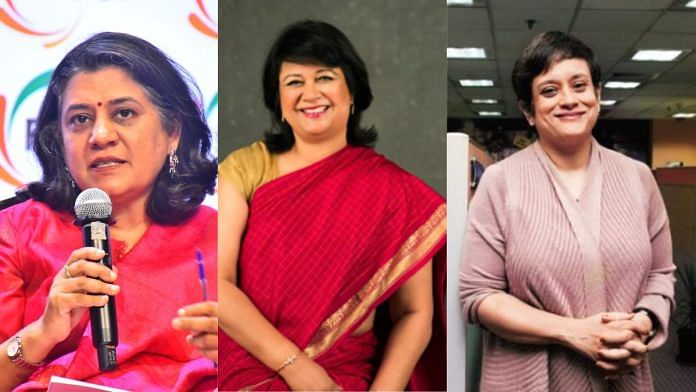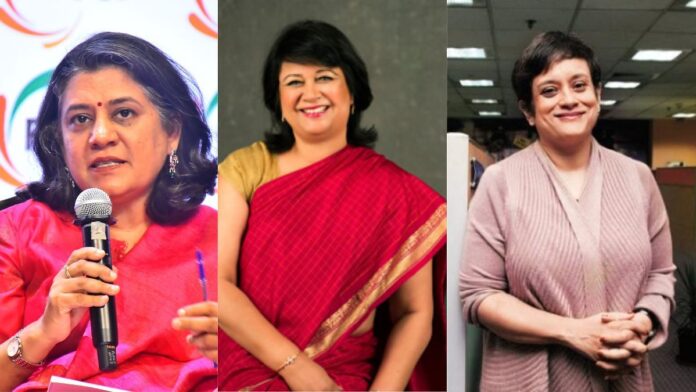


The secretariats of industry associations, which were historically led by men, are now seeing a fresh momentum of women leaders taking charge.
When veteran public policy professional Shweta Rajpal Kohli recently announced the formation of the non-profit Startup Policy Forum (SPF), it marked yet another milestone of women leading an industry association. The non-profit is formed to bring together startups, policymakers and regulators. Kohli said that she launched SPF to drive impact for the ecosystem, create a legacy, and build an institution.
Additionally, the Confederation of Indian Industry (CII), India’s most influential apex association traditionally helmed by men, today boasts of several women at the second-tier leadership level of Deputy Director General. Potentially, any of them could move up to take the top post. This is perhaps a first for the organisation.
For many decades, Tarun Das, the former Director General of CII, and Amit Mitra, the former Secretary General at FICCI, led these organisations to be effective champions for India Inc, especially in the post-1991 economic liberalisation phase.
But more than a decade back, women leaders slowly started breaching this front. Rekha Sethi was perhaps the first female head of a national business association when she joined the All-India Management Association (AIMA) from CII in 2008. Aparna Dutt Sharma went to the Cement Manufacturers Association (CMA), again from CII, and Debjani Ghosh joined the National Association of Software and Services Companies (NASSCOM). Ambika Sharma moved from FICCI in 2018 to become the Managing Director of the US-India Business Council (USIBC) and Padmaja Ruparel co-founded the Indian Angel Network (IAN).
What accounts for this growing and impactful role of women in the leadership of apex industry chambers and sectoral associations?
“My learnings at CII brought me to AIMA. I believe that fundamentally women are better leaders, are more conscientious and adapt well to changes. The Securities and Exchange Board of India (SEBI) directive in 2013 that there should be at least one woman on a company’s board of directors was the first progressive move toward women empowerment in Indian industry,” said Rekha Sethi, Director General of AIMA. She added that SEBI’s directive has enabled women in business to move up step by step. “The leadership of women in industry associations is a part of that ongoing change.”
The push for gender diversity and women’s leadership development is an ongoing global and Indian effort. Women have gradually broken the glass ceiling in Indian family businesses (Anu Aga and Roshni Nadar Malhotra), global corporations (Indra Nooyi and Leena Nair), philanthropy (Rohini Nilekani), politics and bureaucracy.
With more and more women CEOs at the helm of Indian companies, some of them naturally rise to roles such as President at industry associations. For example, Naina Lal Kidwai, Jyotsna Suri, and Sangita Reddy and Shobhana Kamineni have held such positions. During their tenure, they often build a close working rapport with women officers in the secretariats. These relationships often highlight the officers’ leadership potential, which might have otherwise gone unnoticed.
Vinita Sethi, former Chief Public Affairs Officer of the Apollo Hospitals Group and immediate Past President of the Public Affairs Forum of India (PAFI) has a different opinion. “Industry associations have never been dominated by men. Most have had women-led verticals. I believe that women are often better at sustaining long-term relationships, and loyalty to networks that facilitates their career,” said Sethi.
A significant part of the mission and work at these industry bodies involves public policy advocacy. A key driver that has contributed to the growth and development of public affairs professionals in India was the formation of the Public Affairs Forum of India (PAFI). Vinita Sethi (formerly with Apollo Hospitals Group), Neelima Dwivedi (MSD Pharmaceuticals), Deepshika Dharmaraj (Burson Group India) and Shweta Rajpal Kohli (previously Peak XV, Salesforce and Uber) have grown through PAFI. In the case of Kohli, it is this deep experience, success and knowledge in public policy that has now steered her to form and lead the Startup Policy Forum (SPF).
“As a woman leader, I would be keen to work towards increasing overall diversity in the startup ecosystem, especially in policy-making roles. For instance, with new technologies like Artificial Intelligence (AI), women leaders in policy-making roles can ensure that gender-sensitive and responsible AI frameworks are developed. At the same time, I believe that diversity and meritocracy do not have to be mutually exclusive,” Shweta Rajpal Kohli, President & CEO, SPF, said.
Also read: RBI guv joins chorus urging India Inc to step up investment. ‘Time to come forward in a big way’
Finally, the proof of the pudding is of course in eating. Leaders like Rekha Sethi at AIMA and Debjani Ghosh at NASSCOM brought about transformational changes in the organisations as leaders. This gave more confidence to Indian businesses and their leadership to continue their work of growing the associations.
Rekha Sethi said that one of her prime tasks after joining AIMA was to enhance its brand presence. The AIMA was largely perceived to be an event management organisation, according to industry observers. From there, through various innovations, Sethi built upon the management and executive education offerings that AIMA had. It shifted the emphasis from smaller and large number of events to a few impactful flagship events. The organisation also adapted to the changing times—shifting to digital platforms during Covid, offering new products and services and bringing global recognition to AIMA.
By and large, the external world perceives industry associations through the lens of the corporate chieftains who are the public face. But behind that glamour is the hard work of the secretariats that runs these organisations.
Through their growing and impactful roles at industry forums, women are breaking barriers. But it’s just a drop in the ocean. Some estimates suggest that there are about 2,500 industry associations (national and regional) in the country. Much more needs to be done.
The writer is a former editor at the Indian School of Business. Views are personal.
(Edited by Ratan Priya)






